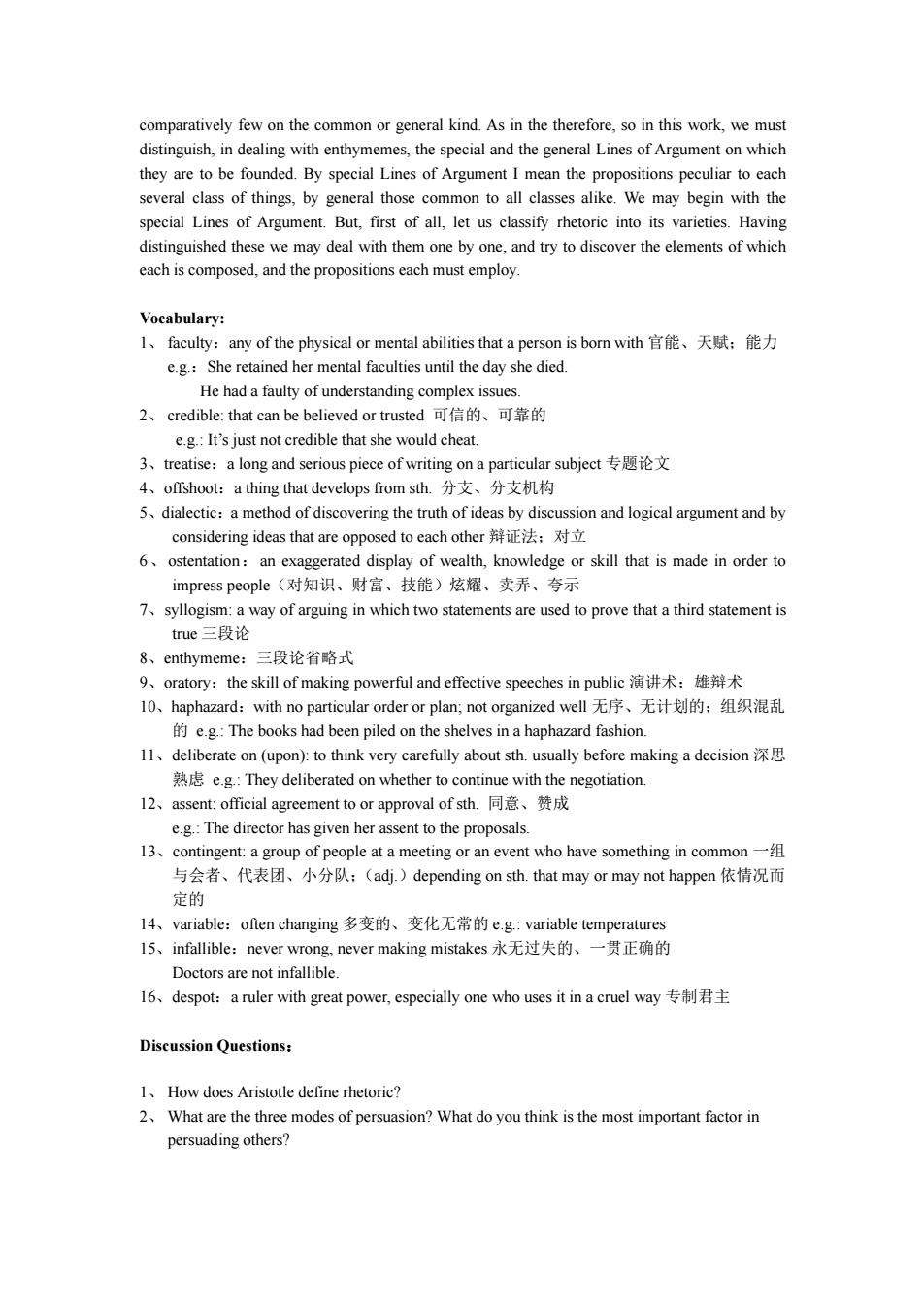正在加载图片...

comparatively few on the common or general kind.As in the therefore,so in this work,we must distinguish,in dealing with enthymemes,the special and the general Lines of Argument on which they are to be founded.By special Lines of Argument I mean the propositions peculiar to each several class of things,by general those common to all classes alike.We may begin with the special Lines of Argument.But,first of all,let us classify rhetoric into its varieties.Having distinguished these we may deal with them one by one,and try to discover the elements of which each is composed,and the propositions each must employ. Vocabulary: I、faculty:any of the physical or mental abilities that a person is born with官能、天赋:能力 e.g.:She retained her mental faculties until the day she died. He had a faulty of understanding complex issues. 2、credible:that can be believed or trusted可信的、可靠的 e.g.:It's just not credible that she would cheat. 3、treatise:a long and serious piece of writing on a particular subject专题论文 4、offshoot::a thing that develops from sth.分支、分支机构 5,dialectic:a method of discovering the truth of ideas by discussion and logical argument and by considering ideas that are opposed to each other辩证法;对立 6.ostentation:an exaggerated display of wealth,knowledge or skill that is made in order to impress people(对知识、财富、技能)炫耀、卖弄、夸示 7.syllogism:a way of arguing in which two statements are used to prove that a third statement is true三段论 8、enthymemes:三段论省略式 9、oratory:the skill of making powerful and effective speeches in public演讲术;雄辩术 lO、haphazard:with no particular order or plan,not organized well无序、无计划的:组织混乱 e.g.:The books had been piled on the shelves in a haphazard fashion. 11 deliberate on(upon):to think very carefully about sth.usually before making a decision e.g.:They deliberated on whether to continue with the negotiation. l2、assent:official agreement to or approval of sth.同意、赞成 e.g.:The director has given her assent to the proposals. 13.contingent:a group of people at a meeting or an event who have something in common 与会者、代表团、小分队:(adj.)depending on sth.that may or may not happen依情况而 定的 l4、variable:often changing多变的、变化无常的e.g:variable temperatures l5、infallible:never wrong,.never making mistakes永无过失的、一贯正确的 Doctors are not infallible. l6、despot:a ruler with great power,especially one who uses it in a cruel way专制君主 Discussion Questions: l、How does Aristotle define rhetoric? 2.What are the three modes of persuasion?What do you think is the most important factor in persuading others?comparatively few on the common or general kind. As in the therefore, so in this work, we must distinguish, in dealing with enthymemes, the special and the general Lines of Argument on which they are to be founded. By special Lines of Argument I mean the propositions peculiar to each several class of things, by general those common to all classes alike. We may begin with the special Lines of Argument. But, first of all, let us classify rhetoric into its varieties. Having distinguished these we may deal with them one by one, and try to discover the elements of which each is composed, and the propositions each must employ. Vocabulary: 1、 faculty:any of the physical or mental abilities that a person is born with 官能、天赋;能力 e.g.:She retained her mental faculties until the day she died. He had a faulty of understanding complex issues. 2、 credible: that can be believed or trusted 可信的、可靠的 e.g.: It’s just not credible that she would cheat. 3、treatise:a long and serious piece of writing on a particular subject 专题论文 4、offshoot:a thing that develops from sth. 分支、分支机构 5、dialectic:a method of discovering the truth of ideas by discussion and logical argument and by considering ideas that are opposed to each other 辩证法;对立 6、ostentation:an exaggerated display of wealth, knowledge or skill that is made in order to impress people(对知识、财富、技能)炫耀、卖弄、夸示 7、syllogism: a way of arguing in which two statements are used to prove that a third statement is true 三段论 8、enthymeme:三段论省略式 9、oratory:the skill of making powerful and effective speeches in public 演讲术;雄辩术 10、haphazard:with no particular order or plan; not organized well 无序、无计划的;组织混乱 的 e.g.: The books had been piled on the shelves in a haphazard fashion. 11、deliberate on (upon): to think very carefully about sth. usually before making a decision 深思 熟虑 e.g.: They deliberated on whether to continue with the negotiation. 12、assent: official agreement to or approval of sth. 同意、赞成 e.g.: The director has given her assent to the proposals. 13、contingent: a group of people at a meeting or an event who have something in common 一组 与会者、代表团、小分队;(adj.)depending on sth. that may or may not happen 依情况而 定的 14、variable:often changing 多变的、变化无常的 e.g.: variable temperatures 15、infallible:never wrong, never making mistakes 永无过失的、一贯正确的 Doctors are not infallible. 16、despot:a ruler with great power, especially one who uses it in a cruel way 专制君主 Discussion Questions: 1、 How does Aristotle define rhetoric? 2、 What are the three modes of persuasion? What do you think is the most important factor in persuading others?